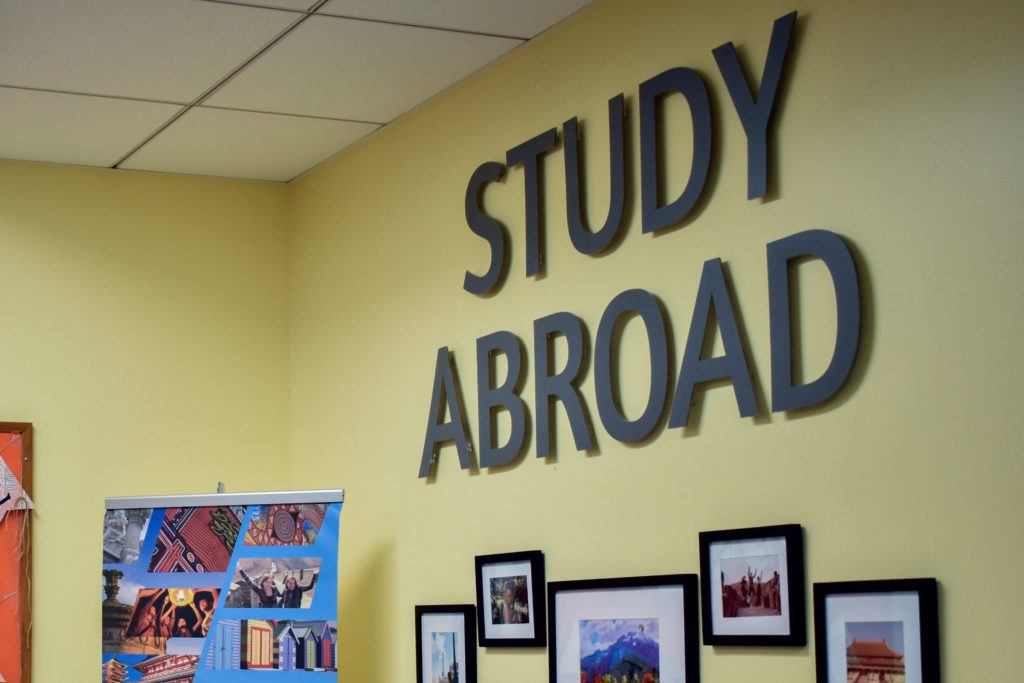As universities across the country begin to announce their decisions for fall study abroad programs, officials have yet to make a formal announcement on whether they will run programs in the fall.
After suspending the programs following the outbreak of COVID-19 last spring, officials said they’re still exploring options for safe study abroad programs in the fall. Experts in international education said many institutions have resumed fall travel plans while others continue to suspend them based on travel restrictions and COVID-19 risks in other countries.
University spokesperson Crystal Nosal said officials are still exploring the “potential for return” to study abroad programs in the next academic year as they continue to monitor health and safety concerns globally. She declined to provide further details about whether programs could resume, how many students are currently registered and what changes officials could implement in the programs in light of the pandemic.
“We are anticipating a transition year for study abroad opportunities and cannot answer specific questions until a more detailed announcement is made to the community,” she said in an email.
Provost Brian Blake announced in January that the Office of Study Abroad would suspend opportunities this summer, citing the ongoing pandemic and vaccine rollout during the time. Officials canceled all study abroad and non-essential international travel this academic year.
Study abroad directors at other universities said the likelihood of program offerings returning next fall largely depends on school policy and the health and travel recommendations from government and health organizations.
With increased vaccinations worldwide, they said the return to normal study abroad programming is slowly underway, and the likeliest destinations to welcome students back next fall include Europe and some parts of Asia and Latin America.
The State Department travel advisories currently list about 80 percent of countries under “Level 4: Do Not Travel,” the highest warning in the four-tier system.
Sylvie Burnet-Jones, the interim director of education abroad at the University of Colorado at Boulder, said her school resumed its study abroad programs for this past semester with about 75 students compared to the nearly 2,000 students last spring. She said programs in Spain and Italy have remained the most popular at her institution during the pandemic, but the limited offerings have also piqued students’ interest in locations like South Korea and Denmark.
“Since we had fewer options, the options that remain became more popular, and it was a positive development because it’s allowed students who would not have considered some destinations before,” she said.
She said CU Boulder began offering virtual abroad programs, like online global internships, to faculty and students last summer after in-person programming shut down last spring. She said CU Boulder will continue to pursue more virtual abroad programs in the future even after normal programming returns because they provide greater access to students who can’t travel, like Deferred Action for Childhood Arrivals recipients.
“We discovered that nothing can replace going abroad, being on site, but for some students, we realize that these opportunities actually open doors for students who cannot study abroad for various reasons,” she said.
The GW Institute for Korean Studies will launch a virtual summer study abroad program this month for students interested in learning about Korean culture and history, offering online site visits and lectures on topics like colonization and the Cold War.
Scott Marshall, the president and chief executive officer of Semester at Sea, said his program currently plans for their multi-national voyages to return this fall, but because of the pandemic, he plans to mandate vaccines and reduce the scope of the itinerary that normally spans across continents.
“We hold high health and safety to be the top,” he said. “Our reputation suffers greatly if we didn’t hold that as the top criteria, as would other universities, so we will just do everything possible to ensure that that’s the case.”
He said he anticipates a “pent-up demand” for study abroad from students once the pandemic passes and travel restrictions are lifted, especially beginning in 2022, which will help programs recover quicker.
The European Union recently announced that they plan on letting vaccinated U.S. tourists visit beginning this summer. Several European countries, like Greece, Croatia and Iceland, have already begun admitting vaccinated travelers.
Gina Lopardo, the director of education abroad at Seattle University, said her school recently suspended study abroad opportunities for the fall semester because of its strict travel policy compared to other institutions that have allowed non-essential travel to resume. She said announcing their cancellation decision now also prevents students from committing to programs that may have non-refundable components, like deposits.
She said students have grown “disappointed” and “frustrated” over the past year as officials continue to delay study abroad opportunities, but she remains optimistic for programs to return at her school in 2022 as vaccines against the coronavirus continue to be distributed worldwide.
“It made more sense for us to make a decision now so that our students don’t incur financial losses at this point because they already have to start making deposits for the program they want to participate in,” she said.








